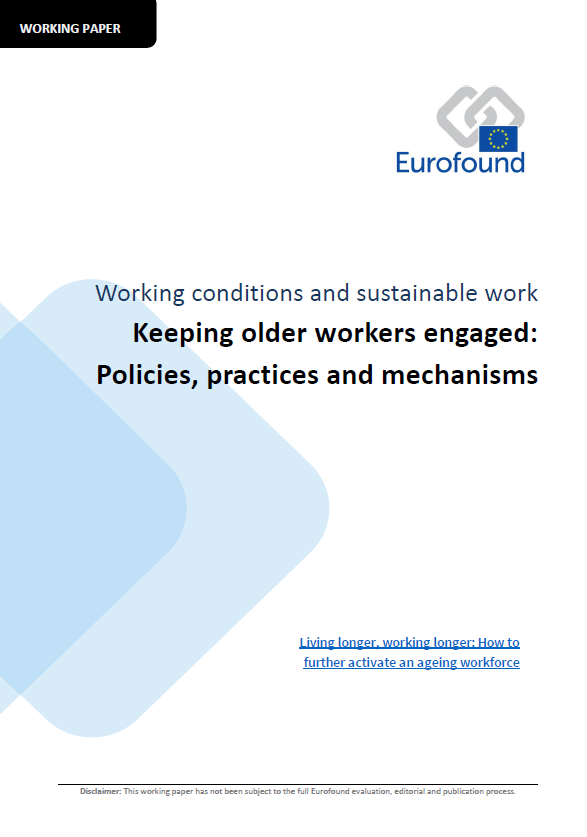EU context
În pofida creșterii substanțiale a ratelor de ocupare a forței de muncă în rândul lucrătorilor în vârstă din ultimul deceniu în multe țări ale UE, raportul comun privind ocuparea forței de muncă din 2017 al Comisiei Europene evidențiază potențialul de creștere și mai mare a acestor rate. În anul 2016, rata de ocupare pentru lucrătorii cu vârste între 55 și 64 de ani în UE a fost de 55,3 %, în comparație cu cei 66,6 % cu vârste între 15 și 64 de ani per total. Creșterea cea mai mare a fost observată în rândul femeilor în vârstă.
Pilonul european al drepturilor sociale oferă un cadru care sprijină piețele de muncă să se adapteze la noile provocări, promovând în același timp echitatea și solidaritatea între generații. Acesta evidențiază dreptul la un mediu de lucru adaptat nevoilor profesionale ale lucrătorilor pentru a le permite să-și prelungească participarea pe piața de muncă. În plus, recentul acord autonom al partenerilor sociali europeni privind îmbătrânirea activă și abordarea inter-generații se angajează să faciliteze participarea activă a lucrătorilor în vârstă și rămânerea lor pe piața muncii mai mult timp.
Activitatea Eurofound
Eurofound are o experiență îndelungată în ceea ce privește problemele cu care se confruntă forța de muncă aflată în proces de îmbătrânire. Cercetarea din anii 1990 s-a concentrat pe rata de participare la forța de muncă, pe performanța locurilor de muncă, pe condițiile de muncă și pe preferințele de muncă ale lucrătorilor în vârstă în contextul politicii demografice dinamice a Europei. Activitățile s-au axat și pe sprijinul public și pe inițiativele la nivel de întreprindere care încurajează ocuparea forței de muncă în rândul persoanelor în vârstă. S-a analizat situația lucrătoarelor în vârstă, cu accent pe creșterea ratelor de ocupare pentru acest grup și creșterea ponderii acestuia în cadrul forței de muncă, în special grupa de vârstă 55 - 64 de ani.
Datele de anchetă
Sondajele majore ale Eurofound oferă o serie de date cu privire la situația lucrătorilor în vârstă. De asemenea, al șaselea sondaj european privind condițiile de muncă (EWCS) a efectuat o analiză comparativă a lucrătorilor în vârstă pe dimensiuni diferite ale calității locurilor de muncă. Deși lucrătorii în vârstă sunt mai puțin susceptibili de a deveni șomeri decât cei mai tineri, datele arată că aceștia consideră că, dacă ar deveni șomeri, nu ar găsi un loc de muncă la fel de bine plătit și ar considera dificilă reintegrarea pe piața muncii.
Un studiu bazat pe al cincilea Sondaj european privind condițiile de muncă (EWCS) a abordat caracteristicile forței de muncă în vârstă și ale muncii la diferite vârste, precum și factorii care fac munca sustenabilă pentru o forță de muncă în proces de îmbătrânire: condiții de muncă bune, bunăstare fizică și psihică și echilibrul dintre viața profesională și cea privată.
Sondajul european privind calitatea vieții efectuat de Eurofound (EQLS) oferă constatări legate de vârstă în raport cu diferite dimensiuni ale calității vieții în Europa. O analiză a preferințelor de lucru după vârsta de 50 de ani se bazează pe concluziile celui de-al treilea EQLS și arată că mulți lucrători în vârstă preferă să lucreze mai puține ore, chiar și după luarea în considerare a nevoilor lor financiare. Facilitarea acestei alinieri mai strânse a orelor de lucru cu preferințele poate permite și motiva oamenii să lucreze mai mult.
O viață activă mai lungă
Recent, Eurofound s-a alăturat altor trei agenții ale UE în abordarea muncii favorabile persoanelor în vârstă în Europa, a provocărilor politice asociate îmbătrânirii forței de muncă și găsirea de soluții inovatoare.
Mulți oameni nu sunt în stare sau nu sunt motivați să lucreze până la vârsta legală de pensionare. Cu toate acestea, există și un grup care este capabil și dispus să lucreze dincolo de această vârstă. Eurofound a investigat acest fenomen din ce în ce mai prezent al efectuării unei activități profesionale după pensionare.
Cercetările recente s-au axat pe extinderea vieții active prin sisteme flexibile de pensionare, abordând în special schemele de pensionare parțială care pot facilita acest lucru. De asemenea, reevaluările la mijlocul carierei pot contribui la o viață activă mai lungă. Cercetarea a examinat cum pot contribui acestea la clarificarea opțiunilor lucrătorilor de a rămâne în câmpul muncii până la o vârstă de pensionare mai înaintată. Se evidențiază diferitele instrumente dezvoltate de companii pentru a păstra lucrătorii în vârstă.
Alte cercetări documentează inițiative naționale și sectoriale ale guvernelor și partenerilor sociali de a menține lucrătorii în vârstă pe piața de muncă, inclusiv stimulente financiare și condiții îmbunătățite. Într- un proiect anterior au fost analizate inițiative privind gestionarea aspectelor legate de vârstă introduse înainte și după recesiune pentru a evidenția bunele practici în companiile din Europa.
Resurse
















